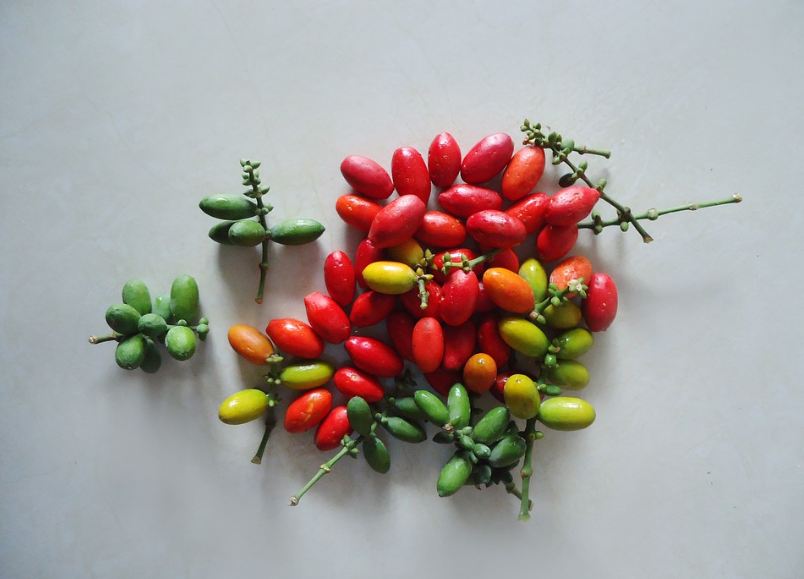The melinjo fruit stemmed from Native Indonesia. Belonging to the Gnetaceae family, the fruit has been scientifically classified as GnetumGnemon. It is cultivated from Malaysia, Thailand, Vietnam, Vanuata, to China. It has a very distinct flavor, with a nudge of bitterness that creates a unique flavor profile.
Melinjo’s tree can reach up to a height of 20 meters and provides fruit after three to four years of cultivation. The fruit itself is oval, coming in various vibrant colors like red, yellow, and orange. Melinjo is appreciated and widely used in Indonesian cuisine. Its seeds weigh up to 5.5 grams and are enjoyed thoroughly. Emping, a popular snack in Indonesia, is made from melinjo seeds.
Brief History
The Yogyakarta Kingdom, in 1755, is one of the earliest places where the melinjo tree was grown in high numbers. People living there had used melinjo’s flowers, leaves, and seeds in numerous dishes for centuries. The tree itself has provided shade to Indonesia’s people from the scorching heat in their tropical islands for several decades.
Melinjo leaves have been in use for a long time, especially in different parts of Asia, the Pacific Islands, and Southeast Asia. As history states, melinjo leaves were first identified and named by Carlus Linnaeus back in 1767. In Northeastern India, melinjo has been visually represented in some religious illustrations.
Nutritional Value of Melinjo
Melinjo is rich in nutrients and minerals that are beneficial to the human body. Below is the nutrition content of melinjo per 100 grams.
- Calories: 92
- Water: 72 grams
- Protein:5 grams
- Lipid: 2 grams
- Ash:9 grams
- Fiber:2 grams
- Carbohydrate:3 grams
- Potassium:39%
- Zinc: 28%
- Iron: 0%
- Magnesium: 2%
Health Benefits of Melinjo
Let us look at some major health benefits of melinjo.
Improves Kidney Health
Melinjo contains phosphorus, which helps the body in maintaining kidney health. Phosphorus helps increase the quantity and frequency of urination and enables the body to maintain a balanced amount of uric acid, fat, salts, water, etc. This ultimately helps the body stay healthy and toxin-free.
Rich in Antioxidants
Rich in antioxidants, melinjo fruit and seeds help reduce the risk of heart diseases and cancer. By fighting off anti-radicals, they provide ultimate protection to body cells.
Maintains Body Temperature
Melinjo is a great source of iron for the human body. One of its purposes is to regulate body temperature. The body’s enzymatic activity and metabolic reactions are dependent upon the core temperature; hence iron helps ensure the proper functioning of body systems through temperature regulation.
Protects the Brain
Rich in potassium, melinjos play an important role in promoting brain health and lowering the risk of strokes. Potassium helps in the transport of oxygen to the brain, facilitating the neural activity. It also relaces blood vessels to make the passage of blood easier. Thus, blood flow is improved, and the chances of stroke are decreased.
Assists in Growth
Melinjo contains copper, which is essential for proper growth. Copper and iron help the body make red blood cells. Further, copper is also necessary for maintaining blood vessels, bones, nerves, and the immune system. Eating melinjo will help growing bodies stay healthy.
Beauty Benefits of Melinjo
Melinjo is a great source of protein, so it promotes the regeneration of cells. This helps improve your hair, skin, and nails. The overall effect on the skin can make one look younger. People suffering from excessive hair fall and damaged hair should increase their consumption of melinjo because the protein in it makes hair stronger, shinier, and healthier.
Melinjo is also beneficial for people who suffer from skin issues, including acne, acne scars, etc., because it contains zinc. Zinc is a cofactor required for many body processes such as cell membrane repair, growth, and immunity. Thus, it helps in healing acne and acne scars
The Role of Melinjo in Disease Prevention
Melinjo can help your body fight diseases. It also makes your body strong to prevent disease occurrence.It contains potassium, which can help prevent strokes in the body by relaxing blood vessels and facilitating blood passage. By transporting oxygen to the brain, potassium also improves brain health.
The antioxidants found in the seeds of melinjo can even prevent cancer to an extent and other heart diseases too. It also protects one from early aging. Melinjo contains iron and so can prevent anemia from developing in the human body.
Side Effects of Melinjo
Over consuming any food can lead to adverse side effects, and the same is true for melinjo. People who have high uric acid should avoid eating melinjo as it can further increase the amount of acid in the body, leading to dangerous health issues. Also, to be safe, it is recommended to eat this fruit after it has been through some cooking process.
Interesting facts about Melinjo
- Emping, a really popular snack made from the seeds of melinjo, was presented to the USA’s former president, Barak Obama when he visited Indonesia in 2010.
- The leaves of Melinjo are actually very significant, too, and provide nutritional value as well; that is why they are considered as vegetables and are a massive part of Indonesian Cuisine.
- In the past, Melinjo was also used as a home remedy to treat those people who had been bitten by dogs.
- The melinjoleaf sap is actually valuable for curing eye infections too.
- Melinjois considered an impeccable substitute for coffee in the Philippines.
- The fruit is easy to grow at home. In its natural habitat, it can be found growing alongside roads. Today, melinjoand is widely available.
Conclusion
Melinjo is a unique fruit that can be enjoyed in various dishes. Its leaves and seeds are also edible and used worldwide for making delicious food. It has a distinct taste and great nutritional value, so you should definitely try this fruit if you haven’t already.

